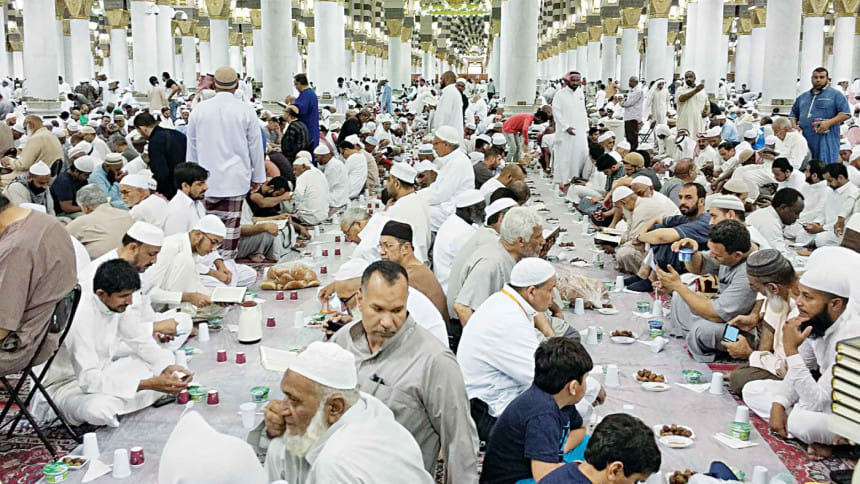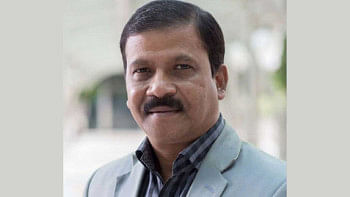The Dimensions of Fasting

I
"You who believe, fasting is prescribed for you, as it was prescribed for those before you, so that you may be mindful of God" ~ Surah Al-Baqara (2:183).
It was 610 AD. The month of Ramadan ("scorching heat"). He approached his favourite sanctuary, cave Hira on Jabal Al Noor (the Mountain of Light). He was in deep meditation. An event happened that changed his life and history.
Angel Jabra-eel (Gabriel) descended from the heavens. Jabra-eel commanded, "Iqra" (read). He responded "I cannot read." Jabra-eel commanded one more time, "Iqra." Jabra-eel then narrated to him what would become the first verses of the Quran, "Iqra Bismi Rabbika…" (Read in the Name of thy Lord).
Puzzled, he narrated the event to his wife, Khadijah. The two went to visit Khadijah's cousin, Waraqah Ibn Nawfal. On hearing, Waraqah testified to the prophethood of Muhammad (PBUH). He warned that those before him who came with such revelations received hostility. Waraqah's words proved true, and he couldn't live to see the ascent of Muhammad (PBUH).
II
Fasting has been practiced from ancient times. The reasons have been spiritual, physiological, and even to avoid food shortage during lean seasons.
Physicians since Hippocrates of Greece believed fasting had healing properties. In India, Ayurveda has prescribed fasting for centuries. In ancient times, warriors would fast before a war. People would fast to avoid natural catastrophes; and also in prayers for the dead and those who aren't in good health.
III
Fasting is observed across religions. Most fasts follow a pattern of two meals. There may or may not be restriction of water, while each religion has their own diet prescriptions. There are differences when fasting takes place and how many days people will fast.
In the Vinaya tradition, Buddhists don't eat after lunch, till dawn the next day. Some Jewish groups fast six days a year. Different Churches fast for 40 days during Lent in commemoration of Christ's journey into the desert for 40 days. Hindus fast on certain days of a lunar month or during religious festivals.
IV
In Islam, compulsory fasting came in three stages. In the first stage, Muslims fasted on Ashura (the 10th day of Al-Muharram). In the second stage, Muslims had the option to fast in Ramadan or feed a person on the days they could not, with preference on fasting. Finally, in the second year of Al-Hijrat, 624 AD, in the month of Shaban, fasting was made compulsory for every able Muslim during Ramadan – with exemptions in certain cases.
The Islamic calendar being lunar means that the first of Ramadan is approximately eleven days earlier each year. Two proper meals are advised. The first during Sehri, after which a fast begins and Iftar, just after sunset when a fast is broken.
Fasting in Ramadan is not just about staying away from food and drink in between Sehri and Iftar. It's an opportunity to look into one's own self to practice self-discipline, and empathy to understand and feel another person's hardships. This is why during this month able Muslims tend to give their Zakaat (2.5 percent of their wealth), one of the five pillars of Islam. At the end of Ramadan, there is celebration, Eid-ul-Fitr.
V
Religions have provided time-tested moral codes of conduct. He who has wealth is obligated to help and take care of those who don't. He who has wealth, should be humble. In these testing times of the coronavirus, may the essence of fasting in Ramadan be to help all we can. May the essence be not to show-off our wealth in the real or the virtual world
Asrar Chowdhury teaches Economics in classrooms. Outside, he watches Test cricket, plays the flute and listens to music and radio podcasts. Email: [email protected] or [email protected]

 For all latest news, follow The Daily Star's Google News channel.
For all latest news, follow The Daily Star's Google News channel. 



Comments